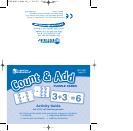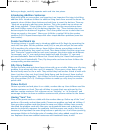
Before you begin, carefully separate each card into two pieces.
Introducing Addition Sentences
Math skills build on one another, and counting is an important first step in building
addition skills. Introduce children to addition using items from around the house. For
example, show children three buttons and ask them to count the buttons. Then say:
“Now we are going to add two more buttons. This is the symbol we use when we
add things together.” Show children the + symbol. Place two more buttons down
and have children count all of the buttons together. Say: “Three buttons plus two
buttons equals five buttons all together. This is the symbol we use to show that two
things are equal or the same.” Show your child the = symbol. Write the number
sentence 3+2=5. Repeat these steps with other simple addition problems (sums less
than twelve).
Puzzle Card Match Up
Counting pictures is a great way to introduce addition skills. Begin by separating the
cards into two piles. Put the problem cards (3+3) in one pile and put the sum cards
(=6) in another pile, picture side up. Have children choose one problem card and
point to the pictures as they count out loud. Then have children find the correct sum
card. There are 2 puzzle cards for each sum; however, the picture sides are different.
For example, one “6” sum card pictures beach balls and the other “6” sum card
pictures basketballs. Remind children that 3 beach balls plus 3 beach balls equals 6
beach balls (not 6 basketballs). Then, flip the puzzle card over to show children the
corresponding number sentence.
Silly Story Problems
Choose 4 puzzle cards and place them picture-side up on a table. Make up a silly story
problem to go along with one card. For example: “Once upon a time, Benny and
Bonnie Bunny were out for a walk. They wished they had another friend to walk with
them. Just then, they met their friend, Betty Bunny and the three of them strolled
through the woods together.” Ask children to find the puzzle card that matches the
silly story problem (2+1=3). Challenge children to make up a silly story for another
puzzle card.
Picture Perfect
Choose a puzzle card and place it on a table, number-side up. Have children read the
number sentence out loud. Then ask children to create their own pictures for the
addition number sentence. Pick a theme such as “birthday” or “at the beach” and
encourage children to draw an addition sentence with pictures related to the theme.
Having “Sum” Fun
Place all the puzzle cards on a table with the number-sides up. Gather up all the “sum”
portions of the cards, and set them aside. Choose one problem card and ask children if
there are other problem cards that have the same sum. When children have correctly
identified the problem cards with like sums, use household items such as buttons or
pennies to pictorially represent the problems. Add the proper sum cards to finish the
sentences, and represent the sums using buttons or pennies, too. As a follow-up activity,
encourage children to find other pairs of numbers that, when added, equal the sum
too. Represent these new addition sentences with household items, as well.
1580 Add & Subt TG_1 3/1/07 11:42 AM Page 2




